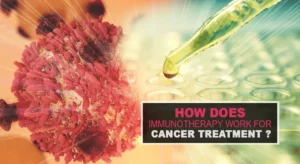Immunotherapy for cancer treatment
Immunotherapy drugs are approved to treat many types of cancer. But it is also a true fact that immunotherapy is not yet as widely used as surgery, chemotherapy, or radiation therapy in cancers treated with immunotherapy.
Here it is awesome slang to shot that Immunotherapy is Impacting All Cancers
Immunotherapy is a form of cancer treatment that uses the power of the body’s immune system to prevent, control, and eliminate cancer. For deatiled info. read: How does immunotherapy work for cancer treatment?
Exploring immunotherapies by cancer type is a pavement to a new era that is approved and proved to be efficacious:
- Immunotherapy for bladder cancer has a long history, including the first FDA-approved immunotherapy treatment (BCG) in 1990.
There are currently eight FDA-approved immunotherapy options for bladder cancer.
Targeted Antibodies: Enfortumab vedotin (Padcev®), Sacituzumab govitecan,
Cancer Vaccines: Bacillus Calmette-Guérin (BCG)
Immunomodulators: Atezolizumab (Tecentriq®), Avelumab (Bavencio®), Dostarlimab (Jemperli), Nivolumab (Opdivo®), Pembrolizumab (Keytruda®)
Immunotherapy has significantly reduced the risk of recurrence for bladder cancer
- Immunotherapy for brain and nervous system cancer offers potential new treatment options for a devastating set of diseases.
There are currently six FDA-approved immunotherapy options for brain and nervous system cancers.
Immunomodulators: Dostarlimab (Jemperli), Pembrolizumab (Keytruda®)
Targeted Antibodies: Bevacizumab (Avastin®) approved for advanced glioblastomas, Dinutuximab (Unituxin®) approved for first-line treatment of high-risk pediatric Neuroblastoma, Naxitamab-gqgk (Danyelza®) approved in combination with GM-CSF for a subset of patients with advanced neuroblastoma
- There are several immunotherapy options for patients depending on breast cancer tumor type.
Targeted Antibodies: Margetuximab-cmkb (Margenza™) approved in combination with chemotherapy for subsets of patients with advanced breast cancer, Pertuzumab (Perjeta®): approved for subsets of patients with HER2-positive breast cancer, Sacituzumab govitecan (Trodelvy®): approved for subsets of patients with triple-negative breast cancer (TNBC)
Trastuzumab (Herceptin approved for subsets of patients with HER2-positive breast cancer
Immunomodulators: Dostarlimab (Jemperli), Pembrolizumab (Keytruda®)
- FDA approval of several immunotherapy options for more lung cancer patients with the approvals to treat patients with immunotherapy as a first-line therapy instead of conventional treatments is new hope
Targeted Antibodies: Amivantamab (Rybrevant™): approved for subsets of patients with non–small cell lung cancer (NSCLC), Bevacizumab (Avastin®): approved for subsets of patients with advanced non-small-cell lung cancer (NSCLC), including as first-line therapy, Necitumumab (Portrazza®): approved for subsets of patients with advanced non-small-cell lung cancer (NSCLC), including as first-line therapy, Ramucirumab (Cyramza®): approved for subsets of patients with non-small cell lung cancer (NSCLC), including as a first-line therapy
Immunomodulators: Atezolizumab (Tecentriq®), Cemiplimab (Libtayo®), Dostarlimab (Jemperli), Durvalumab (Imfinzi®), Ipilimumab (Yervoy®), Nivolumab (Opdivo®), Pembrolizumab (Keytruda®)
Immunotherapy harnesses the body’s own immune system to kill cancer.
Immunotherapy is an umbrella including several treatments.
Types of immunotherapy used to treat cancer. These include:
Immune checkpoint inhibitors: drugs that block immune checkpoints.
Checkpoints – keep immune responses strong by blocking them
And respond more strongly to cancer.
- T-cell transfer therapy– boosts natural ability of T cells to fight cancer.
Immune cells taken from tumor most active against cancer are changed in the lab to attack cancer cells
- Monoclonal antibodies: immune system proteins created in the lab bind to specific targets on cancer cell and destroy them..
- Treatment vaccines: work against cancer by boosting immune system’s response to cancer cells.
- Immune system modulators: enhance the body’s immune response against cancer by affecting specific parts of the immune system
- Adoptive Cell Therapies: group of treatments removes some of immune cells or boosts their numbers or changes them in a lab so they can find and kill cancer cells.
- Tumor-infiltrating lymphocyte (TIL) therapy. T cells -powerful white blood cells are removed. These are T cells that have started to attack tumor. They are grown as a large batch in lab called tumor-infiltrating lymphocytes (TILs), and then put these activated fighters back into host body.
- Engineered T-cell receptor (TCR) therapy. removes T cells from and reprograms them in a lab so they can find the cancer more easily.
- CAR T-cell therapy. adding special receptors to the surface of T cells allow locking onto cancer cell and destroy exact kind of cancer.
Only two CAR T-cell therapies are FDA-approved:
Tisagenlecleucel (Kymriah) treats people up to age 25 with acute lymphoblastic leukemia and adults with certain types of large B-cell lymphoma.
Axicabtagene ciloleucel (Yescarta) treats adults with some types of large B-cell lymphoma, such as non-Hodgkin’s lymphoma.
- Natural killer (NK) cell therapy. Immune cells attack foreign invaders like cancer and adding both CARs to NK cells helps them target the cancer even better.
Director Medical Oncology BLK superspeciality hospital
DNB (Medical Oncology) – Rajiv Gandhi Cancer Institute & Research Centre (RGCI & RC), New Delhi
MD (Medicine) – Maulana Azad Medical College (MAMC), New Delhi
MBBS – Maulana Azad Medical College (MAMC),New Delhi
ESMO Immuno Oncology Perceptorship, Geneva
ESMO Neuroendocrine Tumor Preceptorship, Singapore
Immuno-oncology training from MD Anderson
Cancer Centre, Houston- USA European Certified
Dr. Sajjan Rajpurohit is a renowned and esteemed international Medical Oncologist/Cancer Specialist Doctor based In Delhi NCR with 17plus years of experience and has treated more than 94000 cancer patients- still serving humanity with pride.
Also Read:




